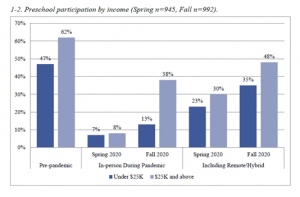Educators are concerned about all students’ learning loss, but for our PreK and K students, a more accurate explanation is that they have lost the opportunity to learn.
30% of the drop in enrollment is in kindergarten, according to an analysis of enrollment data nationally by Chalkbeat and Associated Press. In Texas, a study from the Texas Education Agency published in January showed a 6% decline in K and a 22% decline in PreK enrollment. As Alief Superintendent H. D. Chambers noted to the Houston Chronicle, “We’re going to have a generation of Pre-K through second or third grade across the state of Texas, and across the country, missing out on the most important years of their life in terms of their brain development.”
Steve Barnett with the National Institute for Early Education Research at Rutgers University said that many parents may think that missing kindergarten won’t have much impact on their students, but that “Kids’ learning takes off like bottle rockets in kindergarten. It’s an amazing year for progress, and it sets the foundation for later success.” Read more about what he and other experts have to say in this article.
A NIEER study published last month concluded that “Overall, we found the pandemic resulted in significant loss of important learning opportunities for young children through the fall into December.” NIEER surveyed parents nationally of children ages 3–5 about their home educational experiences and participation in preschool programs. Children from families in poverty had the least access to in-person instruction and less support from their families for learning basic skills.
Preschool participation, including in-person, hybrid, and remote options, declined significantly between spring and fall of 2020, especially among children of poverty and 4-year-olds.

Only 35% of 4-year-olds from families in poverty attended any kind of preschool program, including in-person, virtual, or hybrid. Families in poverty also reported more social-emotional or mental health concerns. At a foundational point in their education, young children are experiencing learning loss and trauma that will resonate through their entire lives.